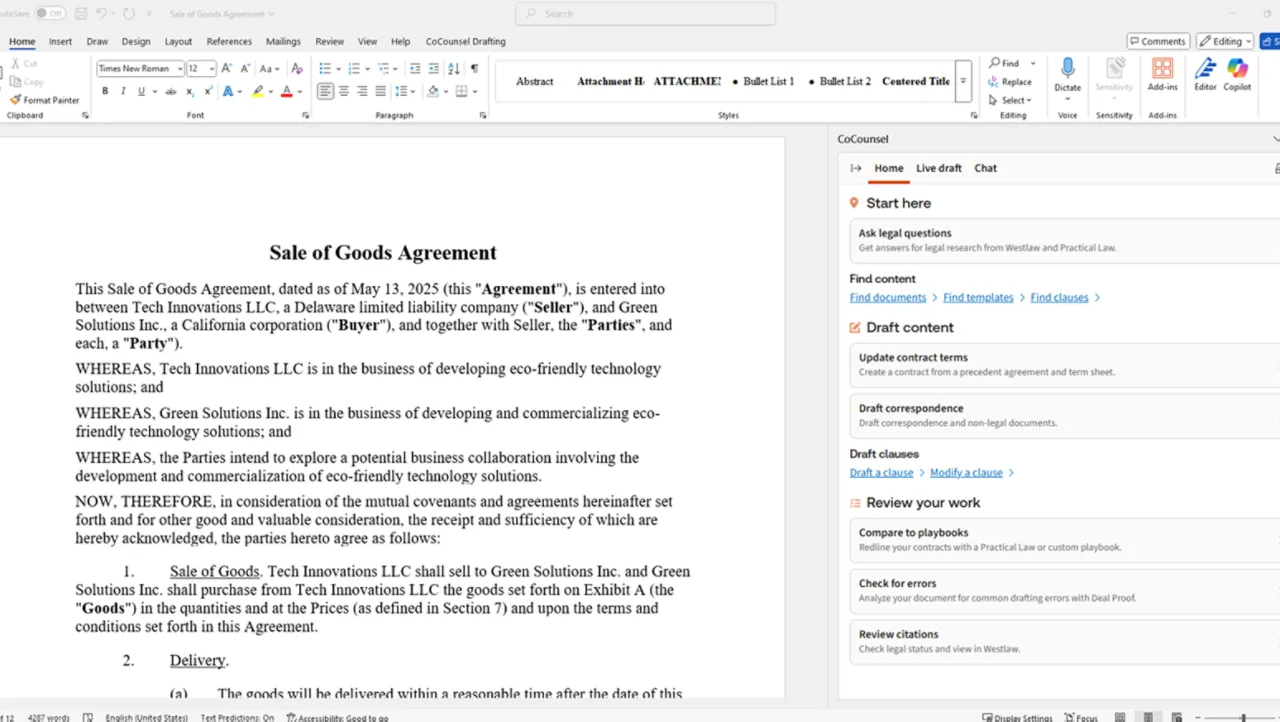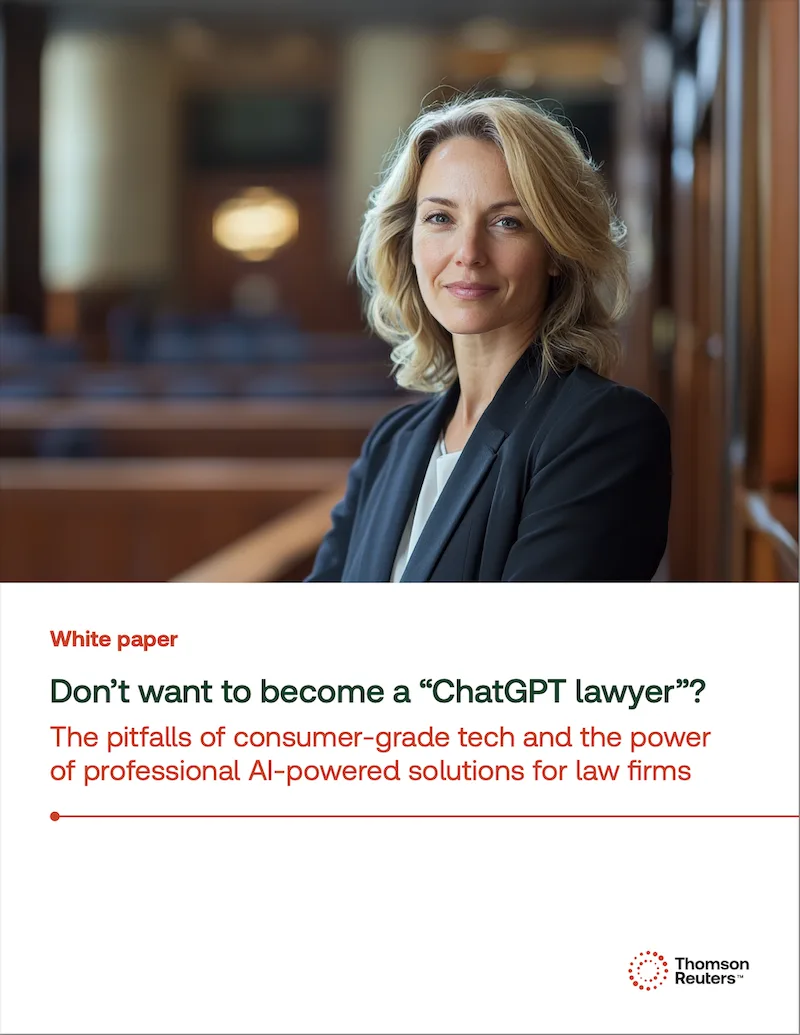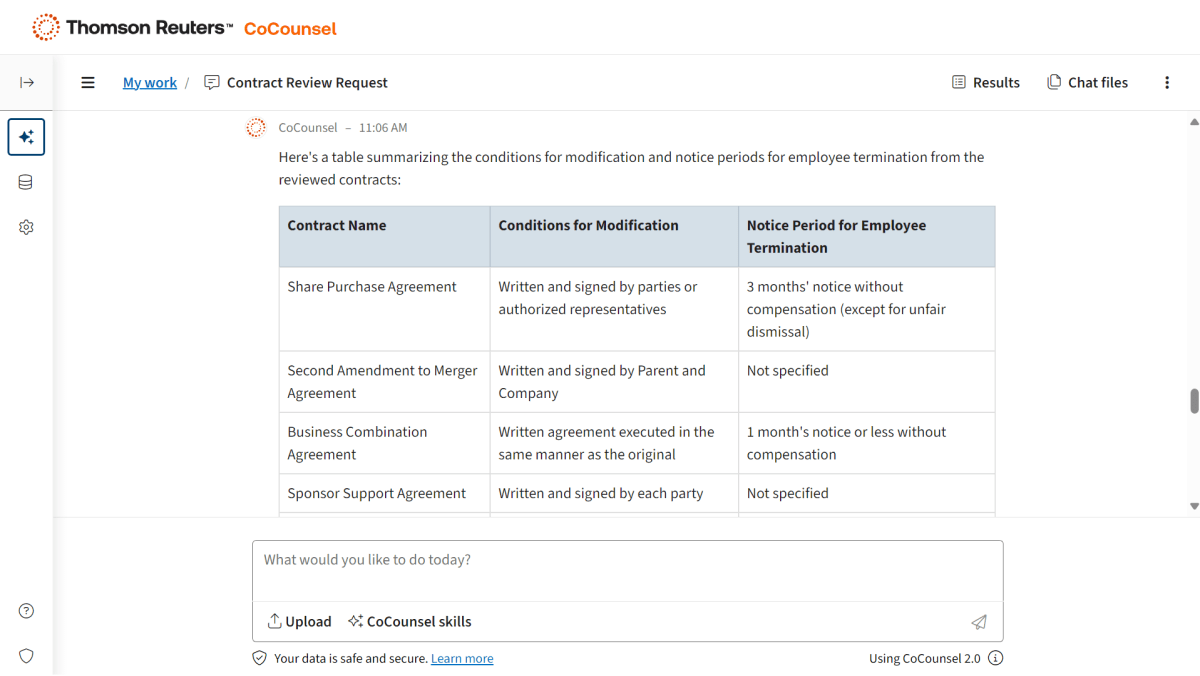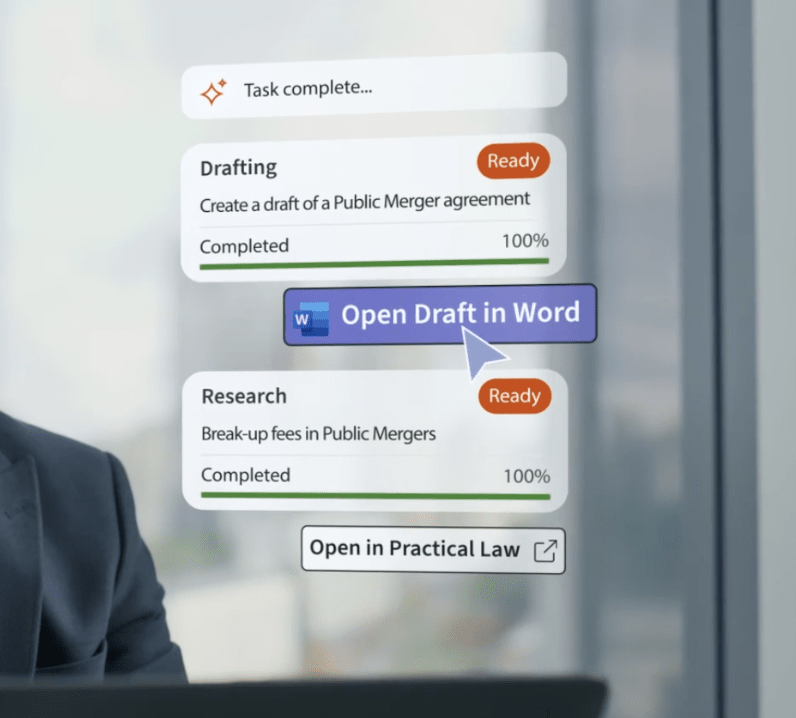A guide to help you navigate AI contract review software — from the basics, to savings, and risks.
Highlights
- AI contract review technology dramatically improves efficiency by augmenting time-consuming tasks such as clause searching and deadline management, resulting in significant time, cost, and employee retention savings for legal firms.
- While AI enhances accuracy, its reliability hinges on being trained with high-quality, domain-specific legal data and human oversight.
- Selecting the right AI tool involves defining specific use cases and evaluating factors such as vendor trust, onboarding, cost, and time-to-value.
Jump to ↓
Improved efficiency
How to choose the right AI contract analysis software

CoCounsel Legal
AI lawyers swear by: Trusted content, expert insights to cut down on contract reviews
See it in action ↗Improved efficiency
Lawyers spend between 40 and 60% of their time drafting legal documents and reviewing contracts. Those are critical tasks, but ones that are time-consuming and inefficient. With hundreds or thousands of contracts to manage, legal professionals keenly understand the efficiency that comes with automating tasks that don’t require legal knowledge and experience.
There’s no need to spend precious hours — or even days — searching for an essential clause in all the contracts you manage when AI can find it for you in seconds. AI-based contract review software can extract critical information pertinent to individual clients, client types, or matters.
AI can also help you manage obligations, payments, and deadlines, with automatic notifications. Think of the time savings and improved accuracy by moving from a hard copy calendar to a digital one. Now take that a step further by not having to enter calendar events at all. AI can pull these dates directly from their original source — the contracts — and auto-notify you when action is required.
The improved contract workflow is another efficiency bonus. From the initial proposal to fulfillment, AI contract lifecycle management (CLM) can build and deploy workflows in minutes with pre-built connectors to your standard systems. Such AI capabilities can modernize, streamline, and simplify the litigation and transactional process, enabling lawyers to prepare, draft, and negotiate agreements with maximum efficiency.
Savings
With efficiency comes savings of all kinds:
Time savings
When your highly trained and highly paid legal professionals spend their time chasing down documents or parts of documents, they’re not adding value to the firm or their clients’ causes.
Think about how much time is spent, perhaps wasted, searching for the right starting point — an average of 15 minutes, according to research from Thomson Reuters — drafting from scratch, and negotiating terms. The ideal contract analysis software automatically detects deviations from third-party contracts and playbooks or standards. That frees up a lot of time and mental capacity for legal professionals to focus on higher-value work.
Dollar savings
More time spent on matters that involve legal expertise means the ability to handle more clients and greater profits for a law firm. There is no sense in dedicating trained, educated legal professionals to work that can be automated to provide greater efficiency and accuracy. Time saved is money saved.
Employee retention
Legal professionals appreciate tools that make their lives easier and help them focus on what they love – using their expertise to help their clients. An environment that embraces these tools is one that helps retain and attract top talent.
For clients, cost savings is not just a bonus – it’s an expectation. If your firm is billing time for document searches that could be automated, the reasonableness of fees could become a point of contention.
Risks
Increased accuracy reduces risks. A solution that leverages trusted content ensures that the language lawyers draft is precise, up-to-date, and reflective of industry standards.
That being said, every advance in technology comes with risks. If AI is trained on bad information, it will return bad information. If it’s trained on legal domain specific, accurate sources of data, that’s what it will extract and return.
More is not necessarily better when it comes to data input. Here’s where human expertise comes into play. The team training the AI should be versed in both the technology and the law to ensure that AI retrieves the right information. For example, with proper training, AI can be trained to find things like a force majeure clause without looking solely at documents that contain the words force majeure – just as an attorney would.
It is important to note that lawyers must be able to oversee their AI tools to effectively ensure compliance with ethical standards. As Ryan Groff, Senior Solutions Consultant at Thomson Reuters, notes: “Verification is the responsibility of our profession and that has never changed.”

White paper
The pitfalls of consumer-grade tech and the power of professional AI-powered solutions for law firms
View white paper ↗How to choose the right AI contract analysis software
With reference to AI everywhere you turn, how do you narrow down the options to find the best fit for your contract management needs? Weigh these considerations in your selection:
What’s your use case?
If you can clearly define the purpose of AI in your firm’s contract management, you’ll have an easier time identifying a solution.
The following are some specific areas where AI contract review and analysis may apply:
Renewable energy
Energy practice areas often deal with complex and specialized contracts, such as power purchase agreements, renewable energy certificates, and leases. You need a platform that can handle the nuances and variations of these contracts, as well as provide insights into market trends and risks.
Look for software that has a dedicated energy module or can be customized to fit your practice area.
Real estate
In real estate, you deal with a high volume of contracts, such as leases, purchase agreements, mortgages, and deeds. You need something that can help you review these contracts faster and more accurately, as well as identify potential issues and opportunities.
Look for software that can extract key data points, such as parties, dates, clauses, and obligations, and compare them against your standards and best practices. A solution that is purpose-built for multi-stage transactions can be an indispensable ally in complex, drawn-out transactions that unfold over a long period of time.
M&A
In mergers and acquisitions, you face tight deadlines and complex negotiations, as well as the risk of missing important details or making costly errors. You need software that can help you conduct due diligence, draft and review contracts, and manage post-closing integration. Look for software that can analyze large volumes of documents, such as NDAs and disclosure schedules, and flag any risks, inconsistencies, or deviations.

You also need software that can generate summaries, reports, and insights that can inform your strategy and decision-making. Lastly, AI-enabled software that can detect deviation in proposed variations of contracts can reduce or eliminate the need for manual comparison, yet still provide assurance that edits or revisions aren’t missed.
What’s the onboarding experience?
Does the software need to be installed on-premises, or is it available on the cloud? Find a solution that provides a bulk upload option and auto-categorization of documents. If installing and using the software requires extensive training, your firm is less likely to take full advantage of it.
What’s the total cost?
Some vendors charge a fee for the initial upload of your documents and an ongoing fee to house your documents in their software. Find a solution with a transparent commercial pricing policy.
What’s the time-to-value?
Pre-trained AI is a huge benefit. If your firm needs to ‘train’ the AI in-house, that requires time, expertise, and motivation you may not have. Even add-on training kits mean someone has to finish building the solution in-house.
What if you need technical support?
Look for a solution that is backed by a solid customer service program. To get the most from your contract management solution, find out if the vendor offers chat or phone responses, a database of questions and answers, and a robust tutorial program.
Is it intuitive?
Software that sits on a digital shelf is a poor investment. It needs to operate seamlessly in the workflow of legal professionals. Look for tools that allow you to utilize your software with other programs such as Microsoft Word and document management systems (DMS).
Whom do you trust?
With AI being the ‘it’ technology, many new players have entered the market. Look for a vendor who has a history of development with AI and language models. Does the vendor also have proven legal expertise?
The most effective AI solutions are developed by data scientists in conjunction with experienced attorneys. This combination may also bring proprietary content into the solution that can be invaluable for legal professionals. One size doesn’t fit all when it comes to AI-enabled software. A resource developed specifically for you and your use case will be a far more useful resource than a general, cookie-cutter program.

AI news and insights
Industry-leading insights, updates, and all things AI in the legal profession
Join community ↗What’s next?
To meet professional standards and obligations, AI solutions require grounding in verified data, rigorous testing, and robust security measures. Public AI products often lack these essential elements.
In contrast, CoCounsel Legal offers a reliable, secure, and comprehensive experience. Thomson Reuters is capable of facilitating the design, development, and launch of new AI capabilities at an accelerated pace with its extensive breadth and depth of content, and adherence to a strict set of AI and Ethics principles.

CoCounsel Legal
AI, trusted content, and expert insights from Westlaw and Practical Law resources
Save time reviewing ↗










